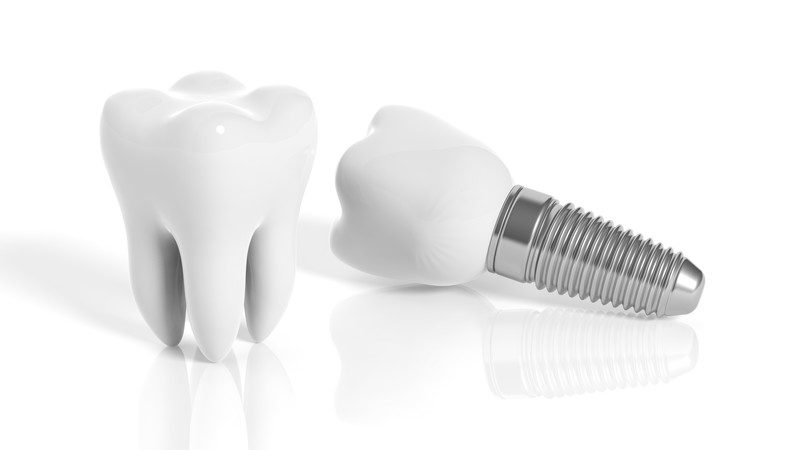Everyone deserves to have a beautiful, healthy smile. Unfortunately, sometimes that’s just not in the cards for us; occasionally it’s not even our faults. Facial trauma and illness can hurt your oral health, resulting in loose, decaying and, eventually, missing teeth. There are several options to restore a smile with oral installations – bridges, dentures, permanent dentures – and all offer their own benefits, which should not be understated.
However, there’s little argument that dental implants are the most effective and holistic way to reconstruct a smile. They replace teeth comprehensively, which has health benefits both above and below the gum line. And unlike other tooth replacement options, they last for several decades when properly cared for. A dental implant dentist who’s proficient in quality tooth implants is fully equipped to replace missing or damaged teeth.
Let’s take a closer look at the types of dental implant procedures we perform at our Wilmington office:
Understanding Dental Implants for Oral Reconstruction
If you’re missing any teeth, dental implants are the best option for tooth replacement. A dental implant is a small titanium or zirconia post (screw) that we surgically attach to your jawbone. This is what eventually allows the metal or ceramic implant to function like a natural tooth.
Once installed in the jaw, the dental implant fuses to your jawbone, forming a stable foundation that, once healed, is every bit as functional as a natural tooth root. And this doesn’t just include a root’s structural purposes.
When you lose a tooth, the jaw bone around that empty socket begins to lose density and shrink from deterioration. This shifts your other teeth, which increases risk of further damage, decay and gum disease. Temporary and semi-permanent tooth replacement options like bridges and dentures fix your smile, but don’t preserve your jaw the way dental implants do, because they don’t replace the “root” of the problem.
Dental implant surgery may sound intimidating, but nowadays it’s a fairly common and fairly simple procedure that is drastically less painful than it used to be. Sometimes, dental implants are done for purely cosmetic reasons — other times they’re functional/restorative. Whatever the case, they are a big investment worth considering carefully. When it comes to dental implant surgery, it pays to do your research.
All great dental implants start with a few components. These three pieces make up the foundation for a quality replacement tooth:
- Post – The post of an implant is the literal metal post that screws into your jawbone and fuses with it via osseointegration.
- Abutment – This part connects the post with the crown and holds everything securely in place.
- Crown – The crown is the part of the implant that actually resembles a tooth. A top-notch dental implant tooth will have a crown that is color-matched to the rest of your teeth.
If you need a tooth replacement, you’re probably wondering what are the best dental implants for you? Let’s take a look at all the available options for dental implants.
Endosteal Dental Implants for Standard Tooth Replacements
Also known as endosseous implants, endosteal dental implants are by far our most popular dental implant. This is the type of implant that is surgically placed into your jawbone at the site of the empty socket. These are the best options for dental implants for most patients with overall good oral health.
However, not everyone is eligible for this standard dental implant procedure. They require a good, healthy jawbone to properly fuse to the post. So if you have severe gum disease, are immunocompromised or are elderly, this option might not be for you.
Dental implant surgery is a process; there is some healing time required. The implant and your jawbone must have time to fuse together and heal. This ensures the implant will serve as a permanent foundation for the artificial crown that will eventually be attached.
Once healed, an artificial tooth can be screwed onto the post so it fits in with your surrounding teeth. We’ll be careful to be sure the new tooth matches the color of the surrounding teeth so everything looks natural. Once patients heal from this particular dental implant surgery, many forget they even have had a tooth replacement.
Subperiosteal Dental Implants for More Complicated Cases
Subperiosteal implants are likely your best alternative to endosteal dental implants. They are a great solution if you don’t have much jawbone to work with and a jaw bone graft won’t do the trick. Instead of being screwed into the jawbone, these implants instead rest on top of the bone but still under the gum. A metal frame is placed under the gum and attached to a post. The gum will heal around the post to hold it in place.
Subperiosteal dental implants look natural as well, but don’t have the same structural integrity as endosteal dental implants since they don’t fuse to the jaw. They’ll need replaced every few years, and will not prevent the jawbone below from changing and shrinking. However, they restore your ability to eat and speak naturally, and only require standard dental care.
Full-Arch Dental Implants for Patients with Extensive Tooth Loss
What’s the best implant option for patients with tons of missing teeth? A staggering number of older patients present with most of their teeth missing. Instead of going through the process of a full set of dental implants, there are other alternatives. Full-arch implants are some of the most proven kinds of tooth implants for patients with extensive tooth loss.
This technique takes the minimal number of implants needed and strategically places them into the jawbone at exact angles. This number is usually 4 or 6 implants, which is how this method gets its alternative names, all-on-4 and all-on-6 implants. Once placed, these implants act as super stable anchors for custom prosthetic teeth—sort of like dentures.
Full-arch implants are some of the most effective tooth implants for patients with significant tooth loss for a number of reasons:
- Preserves jawbone health – This is a big one. The implants used in this method stimulate the jawbone, preventing deterioration and facial sagging.
- Restored functionality of the mouth – Patients can freely eat, speak, and live their life without worry.
- Improved quality of life – Missing a large number of teeth takes on toll on confidence. Restoring both the appearance and functionality with high quality dental implants improves a patient’s confidence tenfold.
Full-arch implants are exceptional options for missing teeth replacement. A visit to your local oral surgeon along with advanced 3D imaging will determine whether or not these are right for you.
Zygomatic Dental Implants for Deteriorated Jaw Tissue
Some patients have jaw bone that is too degenerated to anchor any kind of implant in place, even soft tissue-anchored implants. Zygomatic implants are rare, and are intended to replace the teeth in the upper jaw. They require a complicated and invasive procedure that should only be done if you are not a good fit for endosseous implants or subperiosteal implants.
Zygomatic dental implants are placed in your cheekbone rather than your jawbone, since your cheekbone (zygomatic bone) is much denser than your deteriorated jawbone. Because of the density of the cheek bone, this type of tooth replacement can be a same day dental implant, as you don’t have to wait for the bone to heal around the screw before attaching the replacement teeth.
Zirconia Dental Implants for Non-Metal Tooth Replacements
Zirconia dental implants are noted not by their implant method but by the material they are made from. These implants are an alternative to titanium implants, which are the industry standard. Invented in 1987, zirconia implants are made from a transitional metal called zirconia. Since zirconia is technically a ceramic, many consider this type of implant a more holistic tooth replacement than titanium.
Zirconia is a ceramic consisting of the elements Zirconium and Oxygen (1 atom of Zirconium & 2 atoms of Oxygen). It is considered a transitional metal with an atomic number of 40. Zirconia dental implants contain the metallic atoms of Zirconium, but are not considered to be a metal because of its metal oxide structure (ZrO2). The additional oxide changes its composition structure, behavior, and name.
Zirconia implants, sometimes accidentally referred to as zirconium dental implants, are the best dental implant option for those who might be allergic to metal. They’re also a good alternative to titanium if you are worried about the appearance of titanium implants and gum recession, as zirconia implants are also tooth-coloured.
The catch is that titanium implants have a higher success rate at 97%. Zirconia implants also have a slightly higher rate of breakage. And since they were only invented in 1987, zirconia implants haven’t been around relatively long, so we don’t truly know their long-lasting effects. But these implants are great for soft-tissue response and biocompatibility, and our patients have had great luck with them.
Which Implant Material is Best? A Dental Implant Dentist Helps You Figure That Out
With the number of options for high-quality dental implants, it’s hard to know which material will work best for you. Your local dental implant dentist will help you figure that out. An implant dentist with plenty of expertise is able to assess a combination of factos to help determine the best possible choice for their patient. They essentially look at the pros and cons of common options and compare those to the patient’s specific needs.
A great dentist who does dental implant placements will look at:
- Biocompatibility and allergy status: Titanium is the gold standard for implants, but some patients might be allergic to metal. A dental implant dentist will know when to stick with zirconia implants in the event of allergies.
- Aesthetic considerations: dentists who install dental implants are experts at shade matching, ensuring the replacement tooth matches the existing ones.
- Strength and durability of the material: Titanium is able to hold up to significant force while chewing. Zirconia is regarded as a weaker material, but technology aims to improve this for implants.
- Oral health and bone quality: The current state of the patient’s jawbone will determine what material and implant is right for them. Dental implants require a healthy jawbone to function correctly.
- Cost: Dental implant dentists who are affordable to visit are a big factor in a patient’s decision. Some tooth implant dentists will work with their patients on affordable care.
Same Day Dental Implants for Patients with Great Oral Health
Thanks to modern technology, same day dental implants are possible — providing you have a healthy jawbone and your dental health meets certain conditions. The beauty of having dental implants done on the same day is it minimizes your time in the chair, as well as cuts down the number of trips you need to make to our office. This is especially convenient if you are coming some distance to see us, say if you live in Columbus, Cincinnati, or Dayton.
With this dental implant procedure, we install the abutment and crown at the same time. Sometimes we will bond the new tooth to the teeth that flank it in order to help the implant post stay stabilized while your jaw takes its time to heal around the implant post. Between this specialized same day dental implant surgery and our cost-cutting method of billing for dental implants, our office is worth the trip from those metropolitan areas.
Education Required for Dental Implant Dentists
Rest assured when you visit a local dentist who specializes in implants, you’re likely in good hands. Dental implant dentists have to complete rigorous education and training to earn their license to practice. Dentists who perform tooth implant surgeries have to complete 4 years of undergraduate school, 4 years of dental school, and then there’s post-doctoral training.
Post-doctoral training for dental implant dentists consists of highly specialized training in their field of choice. They might have a residency at a hospital where they focus on complex mouth surgeries, including implant placement. The best dentists who perform implant surgeries will have also had a prosthodontics residency. Prosthodontics specialize in the restoration and construction of replacement teeth, which happens to include dental implants.
After their post-doctoral training, dentists who help create and place tooth implants engage in continuing education and certification. This is what really separates your run-of-the-mill dental implant dentists from highly-skilled dentists who perform tooth implant operations. As dental implant procedures change and evolve with new technology, the dental implant dentists who choose to continue education through certification are best-equipped for the job.
You’ll See Your Local Dental Implant Dentist a Few Times for Implant Surgery
Receiving new dental implants will take a few visits to the dentist who dabbles in implantology. Typically, all patients will start out with an initial consultation. The dental implant dentist performs thorough exams and takes x-rays to determine the state of the jawbone. They’ll go over the patient’s medical history, determining if there are any allergies to be aware of. After this consultation, a treatment plan tailored to the specific patient is created.
Following the consultation, the dental implant dentist will bring the patient in for implant placement surgery. This surgery is all about placing the titanium or zirconia post into the jaw. The post basically functions as a new tooth root. Once the implant placement is finished, osseointegration needs to occur. Over the next 3-9 months, the jawbone grows around the post and fuses with the implant.
Once the osseointegration process is completed, the dentist who performs implant placement procedures will bring the patient back in to finally get the abutment and crown placed. The entire takes a while, understandably, but implants are some of the best options for replacement teeth out there, and they’ll easily last decades with proper care and oral hygiene.
Caring for Your Dental Implants
Even if you get the best dental implants that money can buy, you’re still going to have to take care of them just like the other teeth in your mouth. The good news is that they require fairly similar care to your natural teeth. You’ll still be brushing and flossing twice a day and using antimicrobial rinses if you feel like it. However, you’ll want to be especially meticulous around the dental implant, taking care to remove stuck food and thoroughly brush the implant and the gums above it.
Dental implants that fix your oral health and look good while doing it still have crowns made of materials like porcelain and zirconia, which means you’ll have to keep an eye on your diet. Or rather, the texture and hardness of foods that you put in your mouth. Hard foods like beef jerky, pita chips, pizza crust, and even raw veggies require significantly more chewing force, which can damage your crown over time. You don’t necessarily have to outright avoid these foods, but be mindful. For example, if your implant is on the right side of your mouth, maybe chew harder foods gently on the left side of your mouth. The same goes for extra sticky foods too, like caramel.
Besides avoiding trouble foods and following good dental hygiene protocol, the single greatest thing you can do for your new implant is to continue seeing your dentist for regular checkups. A dental implant that gives you the best smile in town is only worth it if you take care of it. Dentists provide professional cleanings around the crown, and they’ll monitor the implant for signs of gum disease.
Finding the Best Dental Implant Dentist for the Job
Dental implants are one oral surgery that requires patience – both on the part of the patient and our oral surgeon. It helps if you work with an oral surgeon best suited for the job — someone who can do all kinds of dental implants, including those more difficult cases. This is especially true if you have problems with a deteriorating jawbone and may need additional procedures done such as dental bone grafting in order to ensure a successful dental implant surgery.
Dr. Puckett is a dental implant dentist who specializes in dental implant surgeries, including ones that require bone and/or soft tissue grafting. Our office’s state-of-the-art, holistic methods of dental grafting and mouth reconstruction are also affordable, because we bill only according to services rendered, not industry-standard increments. With dental implants, this saves our patients upwards of $300 per implant.
Our oral surgeon, Dr. Puckett, is licensed in all methods of anesthesia, and skilled in both pediatric and geriatric oral surgery, including facial trauma reconstruction and intricate myofascial procedures. We offer services such as wisdom tooth extraction, permanent dentures, bridges, root canals, and more.
Think dental implants might be right for you? Schedule a consultation with us to find out!









